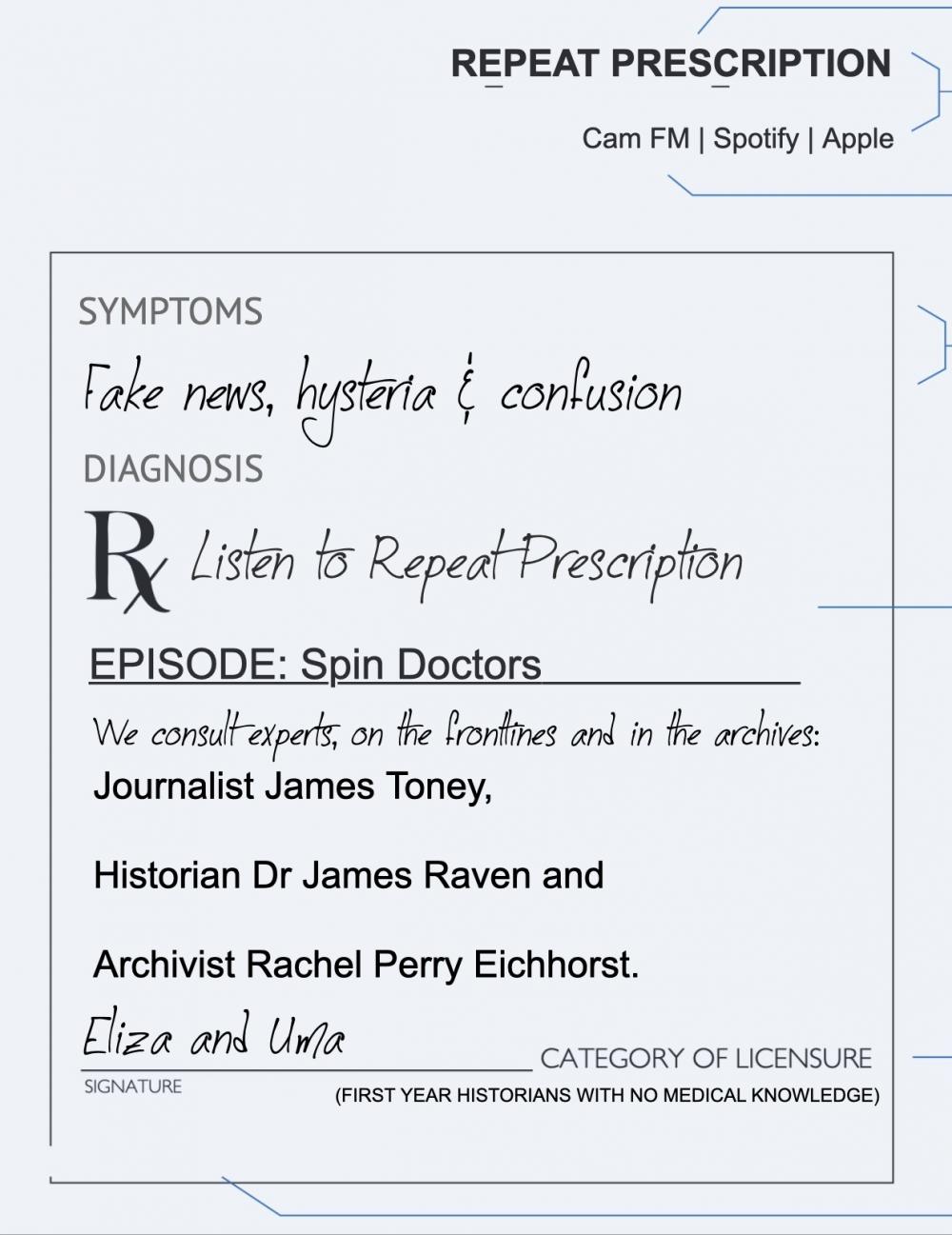Repeat Prescription: A podcast by two first-year historians

During the COVID-19 pandemic, our media has been overflowing with a range of opinions and (mis)information. Amongst the conflicting narratives, one theme has remained consistent: the search for predecessors to the ‘unprecedented’. Many media outlets have appealed to past pandemics as a repeat prescription for our current condition, invoking the Black Death and memories of swine flu.
As historians, we were thrilled to see our discipline valued, but we were also wary of the reporting and curious about how pandemics had been reported in the past. From a historical perspective, we know that how events are recorded and transmitted affects how they are interpreted - both at the time and by future generations. Spurred on by the constant reminder that Newton had spent his lockdown working on his early calculus, we decided to try an experiment ourselves. We created a podcast to explore how the pandemic is being historicised. The project became an opportunity to chat with historians and journalists about the extent to which the media could draw historical parallels and whether this media frenzy had any precedents.
Unlike Newton, our knowledge was minimal, but we compensated for this with enthusiasm. As Freshers writing weekly essays, we had grown accustomed to a habit of work that was ad hoc and harried by relentless deadlines. Planning out a podcast with multiple interviews was new to us and seemed more like crafting a dissertation. It required a more methodical and reflective approach. We did not have much academic authority yet, so we adopted a simple formula for our radio documentary: consulting others with more expertise than ourselves. At first, we worried that the lockdown would pose a real challenge. We were away from Cambridge and could only communicate with our guests and each other online. Fortunately, the situation offered an unprecedented opportunity for two Freshers to get in touch with world-leading experts.
It was amazing how willing people were to help us examine reporting on pandemics, past and present. After reading her article about college life during the Black Death, we contacted Gonville and Caius archivist Rachel Perry Eichhorst. Not only did she teach us lessons from college archives, but she provided great insight into the politics of reporting during the 1918 flu pandemic. This was a timely warning given the hostility and accusations that often surround the media’s coverage of COVID-19. To gain further historical perspective, we sought out Dr James Raven, who we knew from his lectures on urban life and the role of the press in early modern London. He gave us insight into the collection of information in Elizabethan England, illuminating a clear comparison to today’s emphasis on ‘following the science’. Finally, we consulted journalist James Toney for a current perspective on the value and power of information. He shared his thoughts on the responsibility of journalists to enforce accountability and explained how this intersects with the business interest of the media.
After we had spoken to our experts, we edited the programme, weaving the responses together to compare and contrast historical and modern reporting. Our aim was to make our podcast accessible, insightful, and informative. In our modern, globalised world, there is an abundance of information available. While we often hear laments for a ‘simpler’ time, our programme reveals a familiar appetite for accurate knowledge and communication during past crises.
We recorded our podcast during the first lockdown in 2020 and debuted it during the second in November. Now, evaluating the project during the third lockdown, we can see how the media’s response has evolved in the last year, as well as over previous centuries. The podcast raised questions about the media’s responsibility to combat inaccuracy. Such questions are all the more pressing given the current disinformation encouraging distrust of the new vaccines and the role of social media in influencing public opinion.
Past pandemics may have taken a different course but they still offer parallels for our current condition. Though the science of our society is more advanced, individuals are coping much the same way as those in the past – by pursuing knowledge.
Uma Suri (Murray Edwards) and Eliza Pepper (Trinity Hall), are both radio-lovers and historians, now completing their second year at Cambridge.
